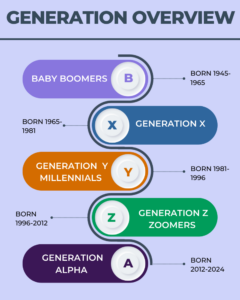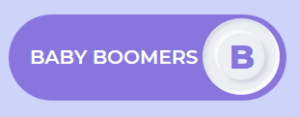Generation X, Y, Z: Generations in the workplace and what they really want
Thanks to changing demographics organizations now have a workforce made up of four generations – the original baby boomers who are reaching retirement age, and their successors generations X, Y, and Z. All of these groups bring different skills and experiences to the workplace – and all have different needs that have to be met to get the most out of them.
This blog sees generation X, Y, Z explained and sets out how organizations can keep all of their multigenerational employees happy.
Why is it important to understand different generations in the workplace?
Perhaps uniquely in history, companies today have to manage multigenerational workforces with a wider range of different values, generation work ethics and generation workplace characteristics. Each generation has been formed by specific experiences which influence their thinking about work. These experiences and values vary considerably, meaning that HR policies that appeal to one generation might upset employees from another generation and cause them to leave. There may be friction between generations that companies have to deal with if they are to motivate everyone to work effectively.
At the same time organizations need the skills and experiences that every generation brings – after all, they have to appeal to consumers that also span different generations and demographics. Organizations must put in place strong, empathetic leadership that understands every member of the team as an individual and as a part of their generation in order to harness their talents effectively.
What are the generations in the workplace?


Baby Boomers (born 1945-1965; c21% of the US population): the post-war generation. They are formal and focused on stability and rules.

Generation X (born 1965-1981; c20% of the US population): unlike their baby boomer parents, Gen X want to be independent and less formal. Read our Gen X Deep Dive.

Generation Y/Millennials (born 1981-1996; c22% of the US population): the Millennial generation. Ambitious, with high expectations, they are self-confident and question everything. Read our Gen Y Deep Dive.

Generation Z/Zoomers (born 1996-2012; c21% of the US population): the newest generation to enter the workplace. They’ve been through a lot in their lives, including financial recessions and COVID at key points in their development and are the most diverse generation yet. Read our Gen Z Deep Dive.
What do generations expect from their employer?
Each generation has its own expectations when it comes to work:
- Baby boomers – focused on security, they like hierarchies and live to work. Many have spent their entire working lives with a single employer.
- Generation X – while they work (and play) hard, they are focused on work/life balance, rather than spending all of their lives in the office. Like working in teams, self-effacing but want respect for their work. Don’t want to be micro-managed.
- Generation Y – they are focused on purpose and look for meaning and tolerance in the companies they work for. They want to give and receive constant feedback on their performance and the working environment. They want flexibility in how and where they work.
- Generation Z – they want support for their mental health and, like Gen Y, to work for companies with a sense of purpose and to be given the chance to work flexibly. However, they value financial rewards and security more than Gen Y.
What are the challenges of working with different generations?
Each generation responds best to specific working environments. These different elements can be broadly grouped into six areas:
1. Rules and hierarchies
Baby boomers like to follow rules and operate in a formal, structured hierarchy. They like to be told what to do. Given that many are now very senior leaders this means their default behavior is to manage people in this way. Gen X, Y, Z are all quite different, being much less formal and demanding openness and independence in how they do their jobs. Forcing them to work in set ways will cause resentment and may mean they leave.
2. Work/life balance
Perhaps in reaction to the workaholic characteristics of baby boomers, subsequent cohorts, particularly Gen X, value generation work/life balance. They are happy to work hard but want a strong home and social life too. Therefore, expecting them to work excessive overtime is viewed extremely negatively. This desire for balance means Gen X, Y and Z are keen on flexible working, in terms of both where they work and working hours.
3. Independence
Gen X is the most independent of the generations due to its position as the first cohort which had both parents working. Gen Xers are therefore self-reliant and used to just getting on with their jobs, coming up with solutions as required. In contrast, Millennials and Gen Z are keen to receive constant feedback on their performance to demonstrate that they are doing the right thing and that their work is valued.
4. Purpose and culture
Millennials and Gen Z want to work for purpose-driven organizations that share their values. That means they want to be led by inspirational managers who share a vision that chimes with their own ideas. Like Gen X they want to work for companies with diverse, open, and meritocratic cultures where everyone is able to contribute based on their skills and experiences.
5. Technology
There’s a tendency to see millennials as digital natives, who grew up with smartphones in their hands. However, they learned about technology as it developed – unlike Gen Z who were using it from day one of their lives. Gen X can remember a time before technology, so while they are digitally adept, they don’t rely on it in the same way. Many baby boomers are intrinsically suspicious of technology, seeing it all as new and overwhelming.
6. Loyalty
Famously, many baby boomers never changed company during their entire working lives. Other generations are much more likely to switch if they don’t feel valued or engaged. Gen X led the Great Resignation of 2022 for example. However, the picture of younger generations swapping jobs on a regular basis is not wholly true. Many in Gen Z who joined the workforce during recessions (and were potentially made redundant) actually crave security – provided that their employer gives them the opportunities they need to grow and the working environment they are looking for.
Empathy, understanding and a strong corporate culture are more important today than ever before
Delivering on these needs requires everyone, from every generation, to practice empathy and understanding around the needs of others. They should value the diverse skills and experiences in the workforce and learn from each other, rather than judging against their own backgrounds and strengths. This culture has to be led from the top and cascaded through empathetic managers at all levels. Read our blog on managing the multigenerational workforce to find out more.
How are Generation Y and Z changing the world of work?
What employees expect from work is changing, driven by the rise of technology and societal change. Today’s younger employees value areas such as diversity, the need for sustainability and having respect for the views and beliefs of others much more highly than baby boomers, and even Gen X.
This is leading to widespread change in terms of culture, structure, and leadership. Organizations need to embrace diverse, open cultures driven by a sense of shared purpose, where leaders communicate clearly, behave ethically and practice empathy at all times. Leaders must listen to their teams, tap into their skills and experiences and act quickly to support them with the right tools, rewards and working environment. The changes in the world of work mirror what is happening in wider society – meaning that companies that fail to react will not just alienate their employees, but their customers, stakeholders, and wider society.
How Tivian helps your business
Successfully managing multigenerational workforces relies on three key areas:
- strong, open, and inclusive leadership,
- a focus on giving every generation an engaging experience, and
- a transformative culture that will help them thrive.
Tivian provides the tools and expertise to support your success:
- Our employee experience platform makes it simple and fast to regularly listen to every employee’s feedback and then understand and act on their insights.
- Tivian’s Leadership 360 equips leaders with the skills they need to perform effectively and manage multigenerational teams, by collecting 360 degree on-demand feedback on their performance and uncovering areas for growth and development.
- Tivian’s Diversity & Inclusion tool helps create open, engaging cultures. It helps identify the specific behaviors that will drive transformation and measures your progress against achieving them through straightforward diagnostics.
Best of all: Tivian’s Communicate XI gives your organization the ability to deliver the right content to all generations, at the right time, through the right channels.

